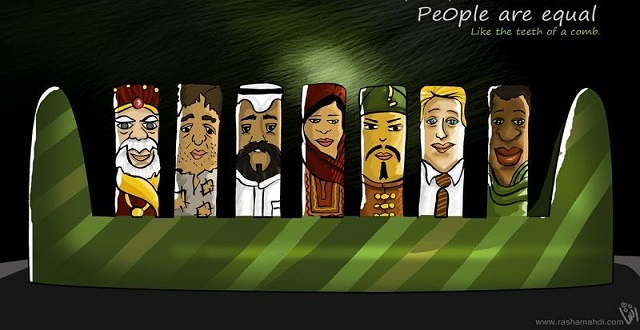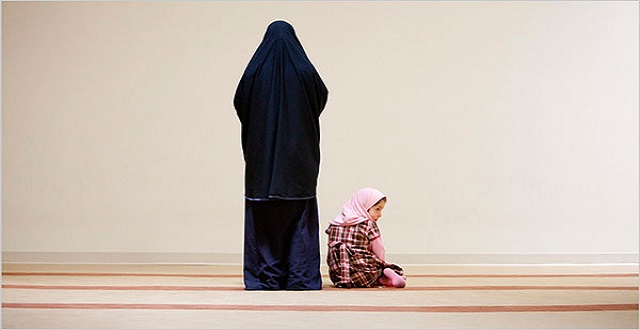What is the Philosophy behind Tayammum?/audio

[su_audio url=”https://byislam.com/en/wp-content/uploads/2014/09/Q-2.mp3″]
Three basic social principles

Imam As-Sadiq (a.s.) said:
اَلنّاسُ سَوَاءٌ كَأَسْنانِ الْمِشْطِ وَ الْمَرْءُ كَثِيرٌ بِأَخِيْهِ وَ لا خَيْرَ فِى صُحْبَةِ مَنْ لَمْ يَرَ لَكَ مِثْلَ الَّذِى يَرَى لِنَفْسِهِ
Translation
People are equal (in social rights) with each other like the teeth of a comb! An individual becomes a great society together with his (religious) brothers. It is not right to associate with one who does not wish for you whatever he wishes for himself.1
Brief Description
Three basic social principles are mentioned in the above tradition.
First, equal rights and justice for everyone irrespective of their color, race, language and social status.
Second, the relationship of an individual with the society and the society with an individual. Each individual counts and in co-operation with his brothers forms a great community.
Lastly, the necessity of respecting the others’ interests as one’s own interests as the basic element of true friendship and companionship. A society devoid of these three principles is neither an Islamic nor a humanitarian society.[divider]
• 1. Tuhaful Uqul, page 274.
Who would be the most dignified person on the day of resurrection?
The Holy Prophet of Islam (peace be upon him and his progeny) said:
إنَّ أَعْظَمَ النَّاسِ مَنْزِلَةً عِنْدَ اللّهِ يَوْمَ القِيامَةِ أَمْشاهُمْ فِى أَرْضِهِ بالنَّصِيحَةِ لِخَلْقِهِ
Translation
The most dignified people on the day of resurrection are those who had engaged most in public service and benevolence.1
Brief Description
One of the ways of service to God’s people is respecting and protecting their interests and their benefits as one’s own interest and benefit, and dealing with them sincerely and benevolently in their presence as well as behind their back.[divider]
• 1. al-Kafi, volume 2, page 166. Wasail Al-Shia, vol 16, page 382. Mustadrak AlWasa’il, vol 12, page 387.
What are the mutual rights of parents and children?

The Holy Prophet of Islam (peace be upon him and his progeny) said:
يَلْزَمُ الْوالِدَيْنِ مِنَ الْحُقُوقِ لِوَلَدِهِما مَا يَلْزَمُ الْوَلَدَ لَهُما مِنْ حُقُوقِهِما
Translation
In the same way as the children are to be held to account for disregarding parents’ rights, parents are also accountable for not observing the children’s rights.1
Brief Description
Rights and duties always go hand in hand. And greater rights call for greater duty and responsibility.
The Holy Qur’an places heavy emphasis on duty to one’s parents. While parents enjoy great rights vis-à-vis their children, they also bear a heavy responsibility to them. They shall at no time neglect to train their children, to help them improve bodily as well as spiritually and to keep them away from mental and moral taints. The tumult of their life shall not hinder them from this great duty.[divider]
• 1. Sayings of the Imams
The excellence of a scholar over a votary

Imam Musa ibn Ja’far (a.s.) said:
فَضْلُ الْفَقِيهِ عَلَى الْعابِدِ كَفَضْلِ الشَّمسِ عَلَى الْكَواكِبِ
Translation
The excellence of a scholar over a votary is similar to excellence of sun over the stars.1
Brief Description
The stars in the sky are themselves luminous but fail to provide luminosity to the Earth and to illuminate the path for us.
Sunlight and its bright and shiny rays, on the other hand, revive and energize the Earth and also light up the path for all inhabitants of planets in the solar system. The sun thus enables others to distinguish the right path from the deviant one, the high road from crag. And it is this that distinguishes a scholar from a devotee. The latter is concerned only with saving himself whereas the former tries to also save others from drowning.
Just as planets need sunlight, votaries need a scholar.[divider]
• 1. Tuhaful Uqul, page 307.

